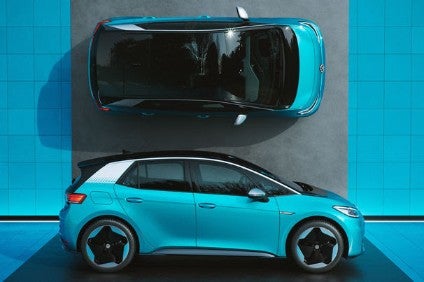
- VW I.D. 3 outsold only by Volkswagen Golf
- Demand for BEV and PHEVs almost quadrupled year on year in December
- Full year registrations off 24% to 11.94m, lowest since 1993
Strong demand for EVs resulted in two electric models securing places in the top three European best-selling cars sales chart last month.
Behind the popular Golf, Volkswagen’s ID.3, launched in the fourth quarter, registered almost 28,000 units and became the second most popular car in Europe, during December, according to JATO Dynamics analysis.

Discover B2B Marketing That Performs
Combine business intelligence and editorial excellence to reach engaged professionals across 36 leading media platforms.
The BEV topped sales charts in the Netherlands, Sweden and Austria and was Germany’s third best-selling car, the fourth best seller in the UK, and second in Denmark, Norway and Luxembourg.
The EV was ahead of a previous UK sales chart topper, the Tesla Model 3, in overall rankings for Europe in December.
JATO said: “Europe is getting ready for an EV revolution and last month’s results are a clear indicator that when these cars have the right price attached to them, they can lure consumer demand away from popular gasoline and diesel models.”
Other models which have benefitted from recent EV growth include the Fiat 500 (boosted by the pure electric version) Peugeot 2008, Hyundai Kona, Opel/Vauxhall Corsa and Renault Zoe. Further down the rankings, other models that performed well included: Seat Leon (+66%), Volvo XC40 (+67%), Skoda Kamiq (+58%), Volkswagen Up (+58%), Kia Niro (+99%), Nissan Juke (+90%) and Leaf (+94%).
The EU27 new car market closed 2020 with further decline. According to data for 27 markets, the volume fell by 3.8% in December 2020 to 1,212,858 units. While this demonstrates a smaller decrease than seen in previous months, this did not offset the overall trend as cumulative registrations for the full year totalled 11,941,633 units, down by 24%.
The last time the industry registered under 12m units was in 1993 when volume reached 11.82m. Felipe Munoz, JATO’s global analyst, said: “While the industry was already showing signs of decline in the last months of 2019, the COVID-19 pandemic has accelerated these existing trends – moving the market into an unprecedented environment, with consumers in lockdown unable to purchase vehicles.”
December’s decline in registrations was driven by double-digit decreases for SUVs in Italy, France and the UK. Despite strong increases posted by BEVs and PHEVs, the total market continued to decline due to this fall in demand alongside poor results for diesel and petrol models.
Among the recent launches, the Ford Puma registered 12,874 units, Volkswagen 4,714 of the ID.4 SUV, Mercedes 4,013 GLBs; Mazda 3,327 of the MX-30, Polestar 3,117 model 2s; Citroen 2,314 units C4s, Audi 1,962 E-Tron Sportbacks and Porsche 1,912 Taycans.
The EU27 market closed 2020 with further decline with volume off 3.8% in December 2020 to 1,212,858 units. While this demonstrates a smaller decrease than seen in previous months, this did not offset the overall trend as cumulative registrations for the full year totalled 11,941,633 units, down by 24%.
Last month, the market share of SUVs decreased from 41.7% in December 2019 to 40.2%.
Registrations fell 7.2% to 487,560 units following an 11% drop across compact SUVs (the largest subsegment).
Munoz said: “Two key factors have contributed to the recent stagnation in SUV growth. Firstly, after several months of continuous growth it was always likely that new SUV registrations would start to level out. Secondly, the new electrification push from governments across Europe has drawn market interest away from SUVs – particularly as there are still very few pure electric SUVs available to buy”. [Recent launches include the I.D.4 and Lexus UXe.]
Demand for petrol and diesel cars (including hybrids and mild hybrids) both fell by 23% in contrast with a 271% increase in BEVs and PHEVs. These results close the gap between EVs and diesels with EVs registering a 24.1% market share, compared to 24.7% for diesel. This is particularly significant when compared to December 2019 – when EVs made up only 6.3% of total registrations.






